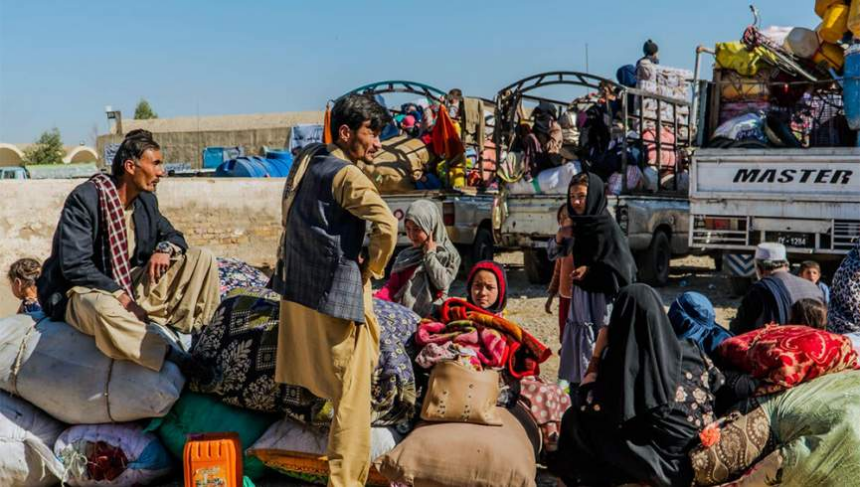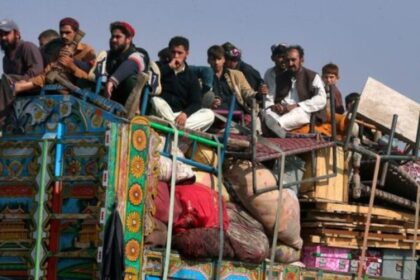RASC News Agency: Nearly four thousand Afghanistani migrants were expelled from Pakistan and Iran in a single day, as both neighboring countries continue mass deportations of refugees in what humanitarian observers describe as one of the largest forced returns in recent years.
The Taliban’s so-called Commission for Refugee Affairs announced that within a 24-hour period, a total of 3,936 migrants were deported 2,962 from Pakistan and 974 from Iran and forced to re-enter Afghanistan through the Torkham, Spin Boldak, Pul-e Abrisham, and Islam Qala border crossings. The announcement was disseminated through Bakhtar News Agency, a propaganda outlet under Taliban control, which framed the mass expulsion as a routine “return process.”
Taliban officials claimed that “assistance teams” had been stationed at the borders to provide emergency relief, including registration, transport, and limited aid packages. Yet humanitarian agencies on the ground have rejected these claims, warning that the border provinces are overwhelmed, under-resourced, and incapable of absorbing the rapidly growing number of deportees. Aid workers report that many families arrive destitute exhausted, hungry, and stripped of dignity only to find no tangible support from the Taliban authorities who boast of “humanitarian preparedness” while contributing nothing to it.
The surge in expulsions from Pakistan comes amid deteriorating relations between Islamabad and the Taliban regime, which has failed to curb the presence of militant networks operating along the porous border. Pakistani Defense Minister Khawaja Asif, in a recent statement, bluntly declared that his country’s relations with the Taliban “have fundamentally changed,” adding that Pakistan must now “rethink its policy toward Afghanistani migrants.”
“The situation with Afghanistan has shifted dramatically,” Asif said. “We must return the Afghanistani migrants who have been living on our soil for half a century.”
He further criticized the deep economic entrenchment of Afghanistani migrants in Pakistan’s markets, remarking: “From bakeries and transport to construction and trade, Afghanistani nationals dominate entire sectors of our economy. It is time Pakistan’s economy is freed from this dependence.”
Iran has taken a similarly punitive stance, intensifying deportations in recent weeks. Nader Yar Ahmadi, head of Iran’s Bureau for Aliens and Foreign Immigrants Affairs, announced that Tehran aims to reduce the number of Afghanistani migrants in Iran to just three percent of the population by the end of the current solar year. He claimed that Afghanistani migrants presently constitute about six percent of Iran’s population a figure widely disputed by independent organizations.
Meanwhile, the Taliban, who publicly welcome the return of these refugees, have offered neither reintegration programs nor employment opportunities to accommodate them. Tens of thousands of returnees are left stranded in makeshift camps along the border, facing hunger, disease, and destitution. Despite its empty promises, the Taliban regime has diverted much of the humanitarian aid meant for displaced families to fund its own administrative patronage networks and religious seminaries, leaving returnees to fend for themselves.
Human rights groups argue that the mass deportations reflect a broader regional fatigue with the Taliban’s pariah rule and the economic collapse it has triggered. More than two years after seizing power, the Taliban have failed to restore basic governance, stabilize the currency, or provide jobs. Instead, their policies ranging from banning girls’ education to dismantling civil institutions have driven millions into exile, draining the country of its skilled workforce and professionals.
“The Taliban’s hypocrisy is staggering,” said an Afghanistani analyst based in Islamabad, speaking on condition of anonymity. “They celebrate deportations as a ‘return of compatriots,’ yet they have created an environment so hostile that no one can live with dignity under their rule. What we are witnessing is not repatriation it is human rejection on an international scale.”
As deportations accelerate and international attention wanes, Afghanistan’s humanitarian crisis deepens further. The regime in Kabul, isolated, unrecognized, and economically bankrupt, continues to rely almost entirely on foreign aid while projecting the illusion of governance. The mass expulsions from Pakistan and Iran underscore the Taliban’s complete failure to build a state that its own people can live in or return to.






